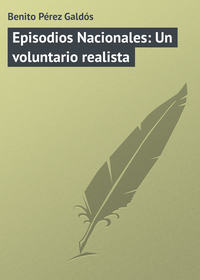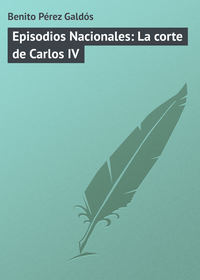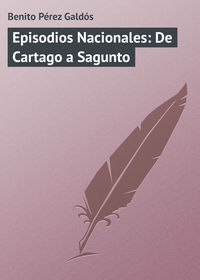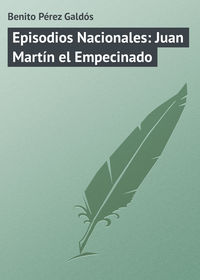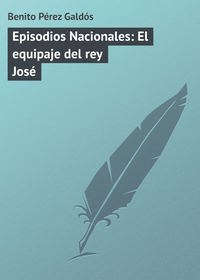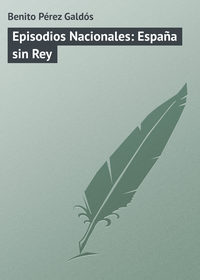 полная версия
полная версияDona Perfecta
After the questions and answers proper to the occasion had been interchanged Don Cayetano said:
“I have already looked at the books. I am very sorry that you did not bring me the edition of 1527. I shall have to make a journey to Madrid myself. Are you going to remain with us long? The longer the better, my dear Pepe. How glad I am to have you here! Between us both we will arrange a part of my library and make an index of the writers on the Art of Horsemanship. It is not always one has at hand a man of your talents. You shall see my library. You can take your fill of reading there—as often as you like. You will see marvels, real marvels, inestimable treasures, rare works that no one but myself has a copy of. But I think it must be time for dinner, is it not, Jose? Is it not, Perfecta? Is it not, Rosarito? Is it not, Senor Don Inocencio? To-day you are doubly a Penitentiary—I mean because you will accompany us in doing penance.”
The canon bowed and smiled, manifesting his pleased acquiescence. The dinner was substantial, and in all the dishes there was noticeable the excessive abundance of country banquets, realized at the expense of variety. There was enough to surfeit twice as many persons as sat down to table. The conversation turned on various subjects.
“You must visit our cathedral as soon as possible,” said the canon. “There are few cathedrals like ours, Senor Don Jose! But of course you, who have seen so many wonders in foreign countries, will find nothing remarkable in our old church. We poor provincials of Orbajosa, however, think it divine. Master Lopez of Berganza, one of the prebendaries of the cathedral, called it in the sixteenth century pulchra augustissima. But perhaps for a man of your learning it would possess no merit, and some market constructed of iron would seem more beautiful.”
The ironical remarks of the wily canon annoyed Pepe Rey more and more every moment, but, determined to control himself and to conceal his anger, he answered only with vague words. Dona Perfecta then took up the theme and said playfully:
“Take care, Pepito; I warn you that if you speak ill of our holy church we shall cease to be friends. You know a great deal, you are a man eminent for your knowledge on every subject, but if you are going to discover that that grand edifice is not the eighth wonder of the world you will do well to keep your knowledge to yourself and leave us in our ignorance.”
“Far from thinking that the building is not handsome,” responded Pepe, “the little I have seen of its exterior has seemed to me of imposing beauty. So there is no need for you to be alarmed, aunt. And I am very far from being a savant.”
“Softly; softly,” said the canon, extending his hand and giving his mouth a truce from eating in order to talk. “Stop there—don’t come now pretending modesty, Senor Don Jose; we are too well aware of your great merit, of the high reputation you enjoy and the important part you play wherever you are, for that. Men like you are not to be met with every day. But now that I have extolled your merits in this way–”
He stopped to eat a mouthful, and when his tongue was once more at liberty he continued thus:
“Now that I have extolled your merits in this way, permit me to express a different opinion with the frankness which belongs to my character. Yes, Senor Don Jose, yes, Senor Don Cayetano; yes, senora and senorita, science, as the moderns study and propagate it, is the death of sentiment and of every sweet illusion. Under its influence the life of the spirit declines, every thing is reduced to fixed rules, and even the sublime charms of nature disappear. Science destroys the marvellous in the arts, as well as faith in the soul. Science says that every thing is a lie, and would reduce every thing to figures and lines, not only maria ac terras, where we are, but coelumque profundum, where God is. The wonderful visions of the soul, its mystic raptures, even the inspiration of the poets, are all a lie. The heart is a sponge; the brain, a place for breeding maggots.”
Every one laughed, while the canon took a draught of wine.
“Come, now, will Senor Don Jose deny,” continued the ecclesiastic, “that science, as it is taught and propagated to-day, is fast making of the world and of the human race a great machine?”
“That depends,” said Don Cayetano. “Every thing has its pro and its contra.”
“Take some more salad, Senor Penitentiary,” said Dona Perfecta; “it is just as you like it—with a good deal of mustard.”
Pepe Rey was not fond of engaging in useless discussions; he was not a pedant, nor did he desire to make a display of his learning, and still less did he wish to do so in the presence of women, and in a private re-union; but the importunate and aggressive verbosity of the canon required, in his opinion, a corrective. To flatter his vanity by agreeing with his views would, he thought, be a bad way to give it to him, and he determined therefore to express only such opinions as should be most directly opposed to those of the sarcastic Penitentiary and most offensive to him.
“So you wish to amuse yourself at my expense,” he said to himself. “Wait, and you will see what a fine dance I will lead you.”
Then he said aloud:
“All that the Senor Penitentiary has said ironically is the truth. But it is not our fault if science overturns day after day the vain idols of the past: its superstitions, its sophisms, its innumerable fables—beautiful, some of them, ridiculous others—for in the vineyard of the Lord grow both good fruit and bad. The world of illusions, which is, as we might say, a second world, is tumbling about us in ruins. Mysticism in religion, routine in science, mannerism in art, are falling, as the Pagan gods fell, amid jests. Farewell, foolish dreams! the human race is awakening and its eyes behold the light. Its vain sentimentalism, its mysticism, its fevers, its hallucination, its delirium are passing away, and he who was before sick is now well and takes an ineffable delight in the just appreciation of things. Imagination, the terrible madwoman, who was the mistress of the house, has become the servant. Look around you, Senor Penitentiary, and you will see the admirable aggregation of truths which has taken the place of fable. The sky is not a vault; the stars are not little lamps; the moon is not a sportive huntress, but an opaque mass of stone; the sun is not a gayly adorned and vagabond charioteer but a fixed fire; Scylla and Charybdis are not nymphs but sunken rocks; the sirens are seals; and in the order of personages, Mercury is Manzanedo; Mars is a clean-shaven old man, the Count von Moltke; Nestor may be a gentleman in an overcoat, who is called M. Thiers; Orpheus is Verdi; Vulcan is Krupp; Apollo is any poet. Do you wish more? Well, then, Jupiter, a god who, if he were living now, would deserve to be put in jail, does not launch the thunderbolt, but the thunderbolt falls when electricity wills it. There is no Parnassus; there is no Olympus; there is no Stygian lake; nor are there any other Elysian Fields than those of Paris. There is no other descent to hell than the descents of Geology, and this traveller, every time he returns from it, declares that there are no damned souls in the centre of the earth. There are no other ascents to heaven than those of Astronomy, and she, on her return, declares that she has not seen the six or seven circles of which Dante and the mystical dreamers of the Middle Ages speak. She finds only stars and distances, lines, vast spaces, and nothing more. There are now no false computations of the age of the earth, for paleontology and prehistoric research have counted the teeth of this skull in which we live and discovered the true age. Fable, whether it be called paganism or Christian idealism, exists no longer, and imagination plays only a secondary part. All the miracles possible are such as I work, whenever I desire to do so, in my laboratory, with my Bunsen pile, a conducting wire, and a magnetized needle. There are now no other multiplications of loaves and fishes than those which Industry makes, with her moulds and her machines, and those of the printing press, which imitates Nature, taking from a single type millions of copies. In short, my dear canon, orders have been given to put on the retired list all the absurdities, lies, illusions, dreams, sentimentalities, and prejudices which darken the understanding of man. Let us rejoice at the fact.”
When Pepe finished speaking, a furtive smile played upon the canon’s lips and his eyes were extraordinarily animated. Don Cayetano busied himself in giving various forms—now rhomboidal, now prismatic—to a little ball of bread. But Dona Perfecta was pale and kept her eyes fixed on the canon with observant insistence. Rosarito looked with amazement at her cousin. The latter, bending toward her, whispered under his breath:
“Don’t mind me, little cousin; I am talking all this nonsense only to enrage the canon.”
CHAPTER VII
THE DISAGREEMENT INCREASES
“Perhaps you think,” said Dona Perfecta, with a tinge of conceit in her tones, “that Senor Don Inocencio is going to remain silent and not give you an answer to each and every one of those points.”
“Oh, no!” exclaimed the canon, arching his eyebrows. “I will not attempt to measure my poor abilities with a champion so valiant and at the same time so well armed. Senor Don Jose knows every thing; that is to say, he has at his command the whole arsenal of the exact sciences. Of course I know that the doctrines he upholds are false; but I have neither the talent nor the eloquence to combat them. I would employ theological arguments, drawn from revelation, from faith, from the Divine Word; but alas! Senor Don Jose, who is an eminent savant, would laugh at theology, at faith, at revelation, at the holy prophets, at the gospel. A poor ignorant priest, an unhappy man who knows neither mathematics, nor German philosophy with its ego and its non ego, a poor dominie, who knows only the science of God and something of the Latin poets, cannot enter into combat with so valiant a champion.”
Pepe Rey burst into a frank laugh.
“I see that Senor Don Inocencio,” he said, “has taken seriously all the nonsense I have been talking. Come, Senor Canon, regard the whole matter as a jest, and let it end there. I am quite sure that my opinions do not in reality differ greatly from yours. You are a pious and learned man; it is I who am ignorant. If I have allowed myself to speak in jest, pardon me, all of you—that is my way.”
“Thanks!” responded the presbyter, visibly annoyed. “Is that the way you want to get out of it now? I am well aware, we are all well aware, that the views you have sustained are your own. It could not be otherwise. You are the man of the age. It cannot be denied that you have a wonderful, a truly wonderful intellect. While you were talking, at the same time that I inwardly deplored errors so great, I could not but admire, I will confess it frankly, the loftiness of expression, the prodigious fluency, the surprising method of your reasoning, the force of your arguments. What a head, Senora Dona Perfecta, what a head your young nephew has! When I was in Madrid and they took me to the Atheneum, I confess that I was amazed to see the wonderful talent which God has bestowed on the atheists and the Protestants.”
“Senor Don Inocencio,” said Dona Perfecta, looking alternately at her nephew and her friend, “I think that in judging this boy you are more than benevolent. Don’t get angry, Pepe, or mind what I say, for I am neither a savante, nor a philosopher, nor a theologian; but it seems to me that Senor Don Inocencio has just given a proof of his great modesty and Christian charity in not crushing you as he could have done if he had wished.”
“Oh, senora!” said the ecclesiastic.
“That is the way with him,” continued Dona Perfecta, “always pretending to know nothing. And he knows more than the seven doctors put together. Ah, Senor Don Inocencio, how well the name you have suits you! But don’t affect an unseasonable humility now. Why, my nephew has no pretensions. All he knows is what he has been taught. If he has been taught error, what more can he desire than that you should enlighten him and take him out of the limbo of his false doctrines?”
“Just so; I desire nothing more than that the Senor Penitentiary should take me out,”—murmured Pepe, comprehending that without intending it, he had got himself into a labyrinth.
“I am a poor priest, whose only learning is some knowledge of the ancients,” responded Don Inocencio. “I recognize the immense value, from a worldly point of view, of Senor Don Jose’s scientific knowledge, and before so brilliant an oracle I prostrate myself and am silent.”
So saying, the canon folded his hands across his breast and bent his head. Pepe Rey was somewhat disturbed because of the turn which his mind had chosen to give to an idle discussion jestingly followed up, and in which he had engaged only to enliven the conversation a little. He thought that the most prudent course to pursue would be to end at once so dangerous a debate, and for this purpose he addressed a question to Senor Don Cayetano when the latter, shaking off the drowsiness which had overcome him after the dessert, offered the guests the indispensable toothpicks stuck in a china peacock with outspread tail.
“Yesterday I discovered a hand grasping the handle of an amphora, on which there are a number of hieratic characters. I will show it to you,” said Don Cayetano, delighted to introduce a favorite theme.
“I suppose that Senor de Rey is very expert in archaeological matters also,” said the canon, who, still implacable, pursued his victim to his last retreat.
“Of course,” said Dona Perfecta. “What is there that these clever children of our day do not understand? They have all the sciences at their fingers’ ends. The universities and the academics teach them every thing in a twinkling, giving them a patent of learning.”
“Oh, that is unjust!” responded the canon, observing the pained expression of the engineer’s countenance.
“My aunt is right,” declared Pepe. “At the present day we learn a little of every thing, and leave school with the rudiments of various studies.”
“I was saying,” continued the canon, “that you are no doubt a great archaeologist.”
“I know absolutely nothing of that science,” responded the young man. “Ruins are ruins, and I have never cared to cover myself with dust going among them.”
Don Cayetano made an expressive grimace.
“That is not to say that I condemn archaeology,” said Dona Perfecta’s nephew quickly, observing with pain that he could not utter a word without wounding some one. “I know that from that dust issues history. Those studies are delightful and very useful.”
“You,” said the Penitentiary, putting his toothpick into the last of his back teeth, “are no doubt more inclined to controversial studies. An excellent idea has just occurred to me, Senor Don Jose; you ought to be a lawyer.”
“Law is a profession which I abhor,” replied Pepe Rey. “I know many estimable lawyers, among them my father, who is the best of men; but, in spite of so favorable a specimen, I could never had brought myself to practise a profession which consists in defending with equal readiness the pro and the contra of a question. I know of no greater misjudgment, no greater prejudice, no greater blindness, than parents show in their eagerness to dedicate their sons to the law. The chief and the most terrible plague of Spain is the crowd of our young lawyers, for whose existence a fabulous number of lawsuits are necessary. Lawsuits multiply in proportion to the demand. And even thus, numbers are left without employment, and, as a jurisconsult cannot put his hand to the plough or seat himself at the loom, the result is that brilliant squadron of idlers full of pretensions, who clamor for places, embarrass the administration, agitate public opinion, and breed revolutions. In some way they must make a living. It would be a greater misfortune if there were lawsuits enough for all of them.”
“Pepe, for Heaven’s sake, take care what you say,” said Dona Perfecta, in a tone of marked severity. “But excuse him, Senor Don Inocencio, for he is not aware that you have a nephew who, although he has only lately left the university, is a prodigy in the law.”
“I speak in general terms,” said Pepe, with firmness. “Being, as I am, the son of a distinguished lawyer, I cannot be ignorant of the fact that there are many men who practise that noble profession with honor to themselves.”
“No; my nephew is only a boy yet,” said the canon, with affected humility. “Far be it from me to assert that he is a prodigy of learning, like Senor de Rey. In time, who can tell? His talents are neither brilliant nor seductive. Of course, Jacinto’s ideas are solid and his judgment is sound. What he knows he knows thoroughly. He is unacquainted with sophistries and hollow phrases.”
Pepe Rey appeared every moment more and more disturbed. The idea that, without desiring it, his opinions should be in opposition to those of the friends of his aunt, vexed him, and he resolved to remain silent lest he and Don Inocencio should end by throwing the plates at each other’s heads. Fortunately the cathedral bell, calling the canon to the important duties of the choir, extricated him from his painful position. The venerable ecclesiastic rose and took leave of every one, treating Rey with as much amiability and kindness as if they had been old and dear friends. The canon, after offering his services to Pepe for all that he might require, promised to present his nephew to him in order that the young man might accompany him to see the town, speaking in the most affectionate terms and deigning, on leaving the room, to pat him on the shoulder. Pepe Rey, accepting with pleasure these formulas of concord, nevertheless felt indescribably relieved when the priest had left the dining-room and the house.
CHAPTER VIII
IN ALL HASTE
A little later the scene had changed. Don Cayetano, finding rest from his sublime labors in a gentle slumber that had overcome him after dinner, reclined comfortably in an arm-chair in the dining-room. Rosarito, seated at one of the windows that opened into the garden, glanced at her cousin, saying to him with the mute eloquence of her eyes:
“Cousin, sit down here beside me and tell me every thing you have to say to me.”
Her cousin, mathematician though he was, understood.
“My dear cousin,” said Pepe, “how you must have been bored this afternoon by our disputes! Heaven knows that for my own pleasure I would not have played the pedant as I did; the canon was to blame for it. Do you know that that priest appears to me to be a singular character?”
“He is an excellent person!” responded Rosarito, showing the delight she felt at being able to give her cousin all the data and the information that he might require.
“Oh, yes! An excellent person. That is very evident!”
“When you know him a little better, you will see that.”
“That he is beyond all price! But it is enough for him to be your friend and your mamma’s to be my friend also,” declared the young man. “And does he come here often?”
“Every day. He spends a great deal of his time with us,” responded Rosarito ingenuously. “How good and kind he is! And how fond he is of me!”
“Come! I begin to like this gentleman.”
“He comes in the evening, besides, to play tresillo,” continued the young girl; “for every night some friends meet here—the judge of the lower court, the attorney-general, the dean, the bishop’s secretary, the alcalde, the collector of taxes, Don Inocencio’s nephew–”
“Ah! Jacintito, the lawyer.”
“Yes; he is a simple-hearted boy, as good as gold. His uncle adores him. Since he returned from the university with his doctor’s tassel—for he is a doctor in two sciences, and he took honors besides—what do you think of that?—well, as I was saying, since his return, he has come here very often with his uncle. Mamma too is very fond of him. He is a very sensible boy. He goes home early with his uncle; he never goes at night to the Casino, nor plays nor squanders money, and he is employed in the office of Don Lorenzo Ruiz, who is the best lawyer in Orbajosa. They say Jacinto will be a great lawyer, too.”
“His uncle did not exaggerate when he praised him, then,” said Pepe. “I am very sorry that I talked all that nonsense I did about lawyers. I was very perverse, was I not, my dear cousin?”
“Not at all; for my part, I think you were quite right.”
“But, really, was I not a little—”
“Not in the least, not in the least!”
“What a weight you have taken off my mind! The truth is that I found myself constantly, and without knowing why, in distressing opposition to that venerable priest. I am very sorry for it.”
“What I think,” said Rosarito, looking at him with eyes full of affection, “is that you will not find yourself at home among us.”
“What do you mean by that?”
“I don’t know whether I can make myself quite clear, cousin. I mean that it will not be easy for you to accustom yourself to the society and the ideas of the people of Orbajosa. I imagine so—it is a supposition.”
“Oh, no! I think you are mistaken.”
“You come from a different place, from another world, where the people are very clever, and very learned, and have refined manners, and a witty way of talking, and an air—perhaps I am not making myself clear. I mean that you are accustomed to live among people of refinement; you know a great deal. Here there is not what you need; here the people are not learned or very polished. Every thing is plain, Pepe. I imagine you will be bored, terribly bored, and that in the end you will have to go away.”
The expression of sadness which was natural in Rosarito’s countenance here became so profound that Pepe Rey was deeply moved.
“You are mistaken, my dear cousin. I did not come here with the ideas you fancy, nor is there between my character and my opinions and the character and opinions of the people here the want of harmony you imagine. But let us suppose for a moment that there were.”
“Let us suppose it.”
“In that case I have the firm conviction that between you and me, between us two, dear Rosarito, perfect harmony would still exist. On this point I cannot be mistaken. My heart tells me that I am not mistaken.”
Rosarito blushed deeply, but making an effort to conceal her embarrassment under smiles and fugitive glances, she said:
“Come, now, no pretences. But if you mean that I shall always approve of what you say, you are right.”
“Rosario,” exclaimed the young man, “the moment I saw you my soul was filled with gladness; I felt at the same time a regret that I had not come before to Orbajosa.”
“Now, that I am not going to believe,” she said, affecting gayety to conceal her emotion. “So soon? Don’t begin to make protestations already. See, Pepe, I am only a country girl, I can talk only about common things; I don’t know French; I don’t dress with elegance; all I know is how to play the piano; I–”
“Oh, Rosario!” cried the young man, with ardor; “I believed you to be perfect before; now I am sure you are so.”
Her mother at this moment entered the room. Rosarito, who did not know what to say in answer to her cousin’s last words, was conscious, however, of the necessity of saying something, and, looking at her mother, she cried:
“Ah! I forgot to give the parrot his dinner.”
“Don’t mind that now. But why do you stay in here? Take your cousin for a walk in the garden.”
Dona Perfecta smiled with maternal kindness at her nephew, as she pointed toward the leafy avenue which was visible through the glass door.
“Let us go there,” said Pepe, rising.
Rosarito darted, like a bird released from its cage, toward the glass door.
“Pepe, who knows so much and who must understand all about trees,” said Dona Perfecta, “will teach you how to graft. Let us see what he thinks of those young pear-trees that they are going to transplant.”
“Come, come!” called Rosarito to her cousin impatiently from the garden.
Both disappeared among the foliage. Dona Perfecta watched them until they were out of sight and then busied herself with the parrot. As she changed its food she said to herself with a contemplative air:
“How different he is! He has not even given a caress to the poor bird.”



